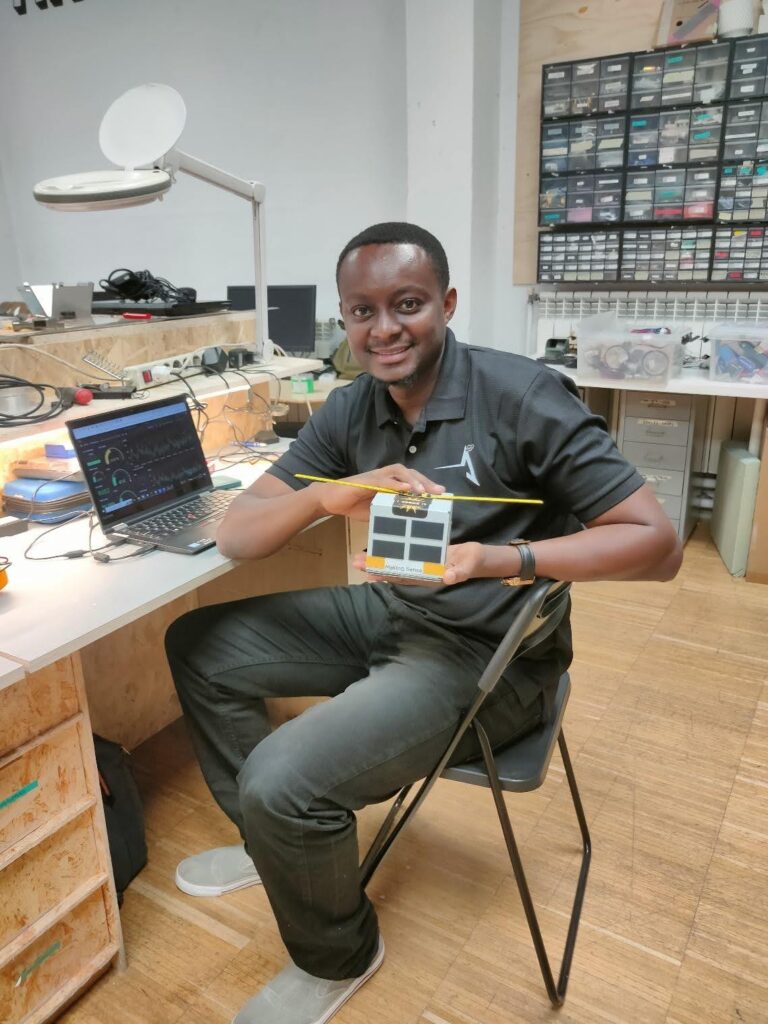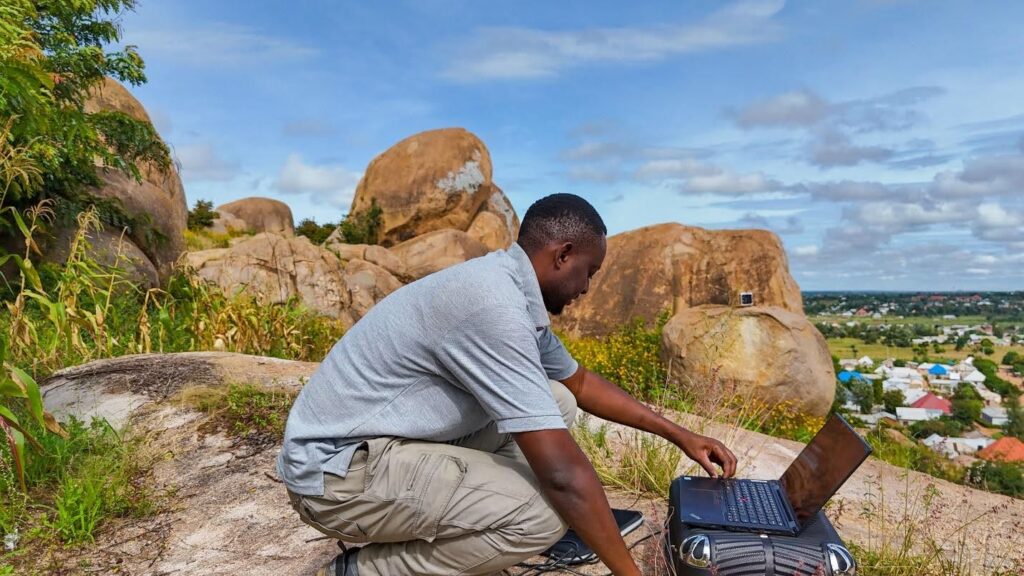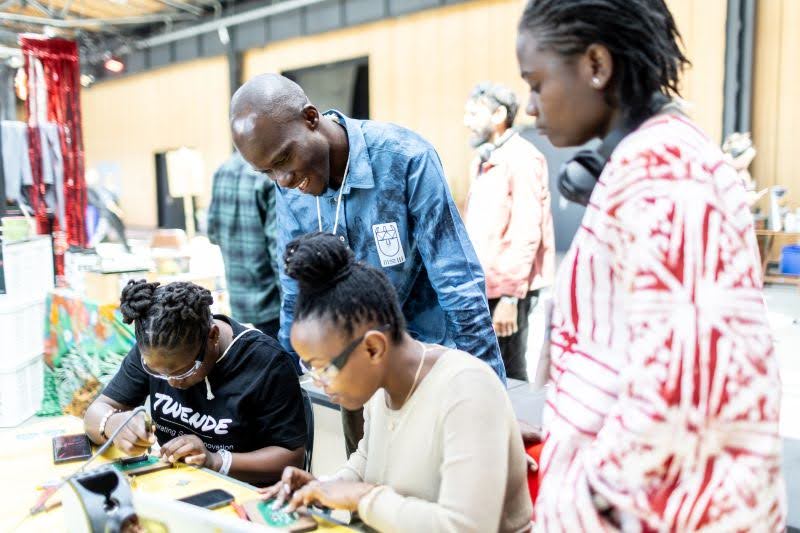The Makers-in-Residency Program at Fab Lab Barcelona: a platform for innovation
In this blogpost, read the testimony of Leonard Shayo, one of the four makers who participated in the Makers-in-Residence program this past summer. He shares his experience at Fab Lab Barcelona, one of the European makerspaces that hosted the program.- October 16, 2024
- 4 min read
My time at Fab Lab Barcelona as part of the Makers-in-Residency Program was an incredibly enriching experience that allowed me to push the boundaries of my innovation. This opportunity was made possible through the mAkE – African European Maker Ecosystem, in collaboration with GreenTec Capital Africa Foundation (GCAF) and Global Innovation Gathering (GiG) organizations. The mAkE project is committed to fostering collaboration and innovation between African and European makers and it has been instrumental in helping makers like myself connect, collaborate, and share knowledge globally, and from which I was offered a unique chance to develop my CubeSat project for environmental research at one of the world’s leading fab labs.
During my one-month residency, I had access to state-of-the-art fabrication tools, experts in the technology, and an ecosystem that fosters creativity and collaboration. Fab Lab Barcelona is more than just a fabrication space; it is a hub for innovative thinkers, designers, and engineers working on cutting-edge projects. The support from mAkE made this residency an unforgettable chapter in my journey, as it gave me the tools and confidence to further my ambitions for Olspace, my aerospace startup in Tanzania.
The CubeSat Project: Environmental Research from Space
This project began in my home lab in Tanzania and was one of the primary reasons I was selected for the Makers-in-Residency Program at Fab Lab Barcelona. The month-long program gave me access to cutting-edge tools and experts, allowing me to refine the CubeSat prototype. Collaborating with scientists and engineers at Fab Lab Barcelona, I was able to make significant progress in the development of the satellite, particularly in areas such as data transmission and IoT integration for environmental monitoring.
The CubeSat (NanoSatellite) aims at environmental research, particularly to study the effects of climate change. It will collect critical data that can help understand shifting weather patterns and their impact on the environment. Tanzania, with its rich ecosystems and biodiversity, is the ideal location for such a study. The CubeSat is designed to gather data that can inform conservation efforts and policies to mitigate the effects of climate change.

Photo credits: Fab Lab Barcelona
The Future of Olspace and the Tanzanian Makerspace Movement
Beyond aerospace, Olspace is also focused on renewable energy projects. In Tanzania, many communities still face challenges with reliable electricity. By combining renewable energy solutions with space technology, our aim is to provide sustainable energy sources to underserved communities across the country. I believe that these initiatives will create jobs, foster innovation, and contribute to the development of Tanzania’s tech ecosystem.
That said, we are still in the process of completing the CubeSat prototype and securing funding for its eventual launch into space. Funding remains one of the major challenges for innovators in Africa, but I am optimistic that with continued effort and the right partnerships, we will achieve our goals.
Challenges and Opportunities for Tanzanian Makers

Tanzania has enormous potential, especially in STEM and innovation. With a population of over 60 million, most of whom are under 30, the country is brimming with young talent eager to learn and innovate. However, there are still significant gaps in makerspaces and STEM facilities, limiting access to tools and resources for many budding innovators.
While FabLabs and makerspaces are growing across Africa, Tanzania still lacks a robust infrastructure to support these initiatives. This is why building a local makerspace lab through Olspace is so critical. By providing access to advanced tools and resources, we can empower the next generation of Tanzanian innovators to take on challenges like climate change, renewable energy, and even space exploration.
After the Makers-in-Residency
The experience at Fab Lab Barcelona has reaffirmed my commitment to building a thriving innovation hub in Tanzania. While the journey is still ongoing, and we have not yet fully completed our CubeSat prototype, I am confident that with the support of partners and global collaborators, we will achieve our goals. Olspace is more than just a startup; it is a movement aimed at driving STEM education, space exploration, and sustainable development across Tanzania and Africa.
Our focus moving forward is on acquiring the necessary equipment, building strong partnerships, and securing funding to turn these projects into reality. Olspace is at the forefront of a movement that will shape the future of innovation in Tanzania, and I am proud to be part of that journey.
By Leonard Shayo
Social media contacts: LinkedIn, Instagram, Youtube
Website: www.olduvaispacecenter.com
Read the other testimonials from the MiR participants:















